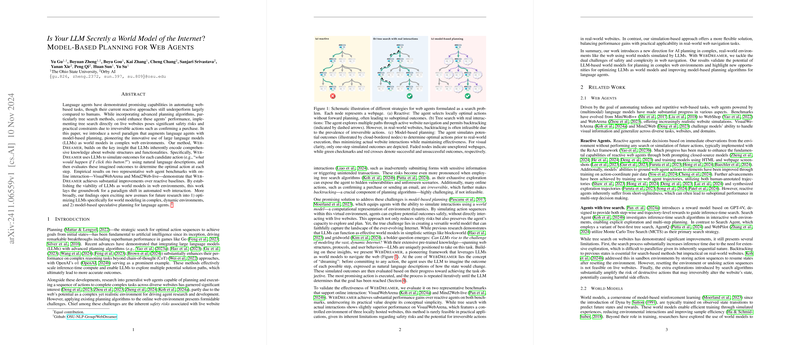Model-Based Planning for Web Agents: A Critical Evaluation of LLMs as World Models
The paper entitled "Is Your LLM Secretly a World Model of the Internet? Model-Based Planning for Web Agents" explores the novel concept of enhancing language agents with model-based planning using LLMs as world models in web environments. The core proposition is the WebDreamer framework, which leverages the inherent ability of LLMs to encode comprehensive knowledge about web structures and functionalities, thus facilitating efficient planning and decision-making processes for web-based tasks.
Technical Approach: WebDreamer
WebDreamer employs model-based planning by utilizing LLMs to simulate potential outcomes of various actions that web agents may execute. The framework operates on the premise that LLMs, trained extensively on web data, inherently possess world models that could predict the results of interactions within internet environments. By preemptively simulating actions, WebDreamer aims to avoid the hazards associated with executing irreversible actions on live websites.
The technical foundation of WebDreamer lies in a model predictive control (MPC)-like strategy, where an LLM is tasked with (i) simulating the website's state changes induced by potential actions and (ii) scoring these simulations to guide action selection. This approach allows for informed decision-making without actual interaction, maintaining a safety buffer against potential negative consequences of real-time web modifications.
Empirical Findings
The empirical evaluation of WebDreamer was conducted on two benchmarks: VisualWebArena (VWA) and Mind2Web-live. The results exhibit substantial performance enhancements over baseline reactive approaches, with significant improvements in success rates—33.3% on VWA, demonstrating WebDreamer's practical advantage. However, the framework fell short of tree search approaches in controlled settings due to the simplicity of the planning algorithm, indicating room for methodological refinements.
Theoretical and Practical Implications
The implications of using LLMs as world models are vast. Theoretically, this paradigm supports the hypothesis that LLMs hold latent capabilities to simulate complex web interactions, thus functioning as ad-hoc planners. Practically, the approach provides a potentially safer and more efficient mode of automating web navigation tasks by minimizing direct interactions, which can pose irreversible consequences.
Challenges and Limitations
Despite the promising results, the paper notes key limitations, such as the computational costs involved with current AI models like GPT-4o and the challenges of long-horizon planning given the propensity for state change simulation to become less accurate with extended use. Furthermore, due to the reliance on extensive simulations, the method demands parallel computations to mitigate latency, which impacts scalability and real-time applicability.
Future Directions
This pioneering work encourages further exploration of LLMs in simulating diverse and real-world environments with greater fidelity. A critical avenue for future research lies in fine-tuning LLMs for enhanced world model capabilities, coupled with the development of more advanced planning algorithms like MCTS to extend WebDreamer's efficacy to complex, multi-step tasks. Additionally, applying these concepts to more varied and unpredictable web tasks could broaden the utility of LLM-based web agents significantly.
Conclusion
WebDreamer offers a compelling demonstration of LLMs augmenting model-based planning in web environments. This paper initiates a dialog on the capabilities of LLMs beyond conventional NLP tasks, suggesting their potential in dynamic, real-world applications. While the path forward presents technical challenges, this direction promises to enrich AI's involvement in interactive and autonomous decision systems.
